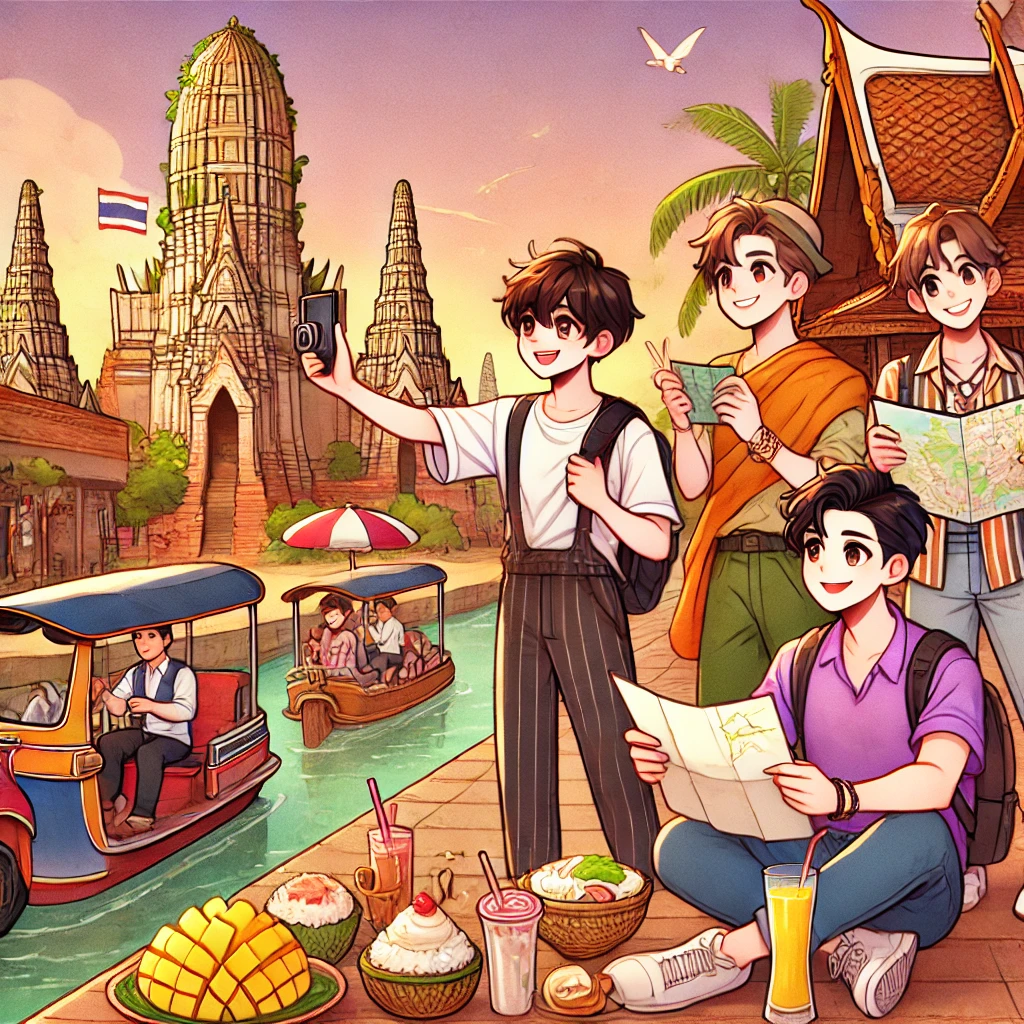แนวทางส่งเสริมการท่องเที่ยวตามรอยนักแสดงซีรีส์วายในประเทศไทยบนพื้นฐานของแนวคิดซอฟต์พาวเวอร์ (Guidelines for promoting Y-series-induced tourism in Thailand based on the concept of soft power)
Main Article Content
Abstract
งานวิจัยเรื่องนี้ มีวัตถุประสงค์ 1) เพื่อศึกษาความรู้สึกร่วมต่อการท่องเที่ยวของนักแสดงซีรีส์วายที่ทำให้เกิดปรากฏการณ์การท่องเที่ยวตามรอย 2) เพื่อศึกษาการตัดสินใจท่องเที่ยวตามรอยนักแสดงซีรีส์วายในประเทศไทย และ 3) เพื่อเสนอแนวทางการส่งเสริมการท่องเที่ยวบนพื้นฐานของซอฟต์พาวเวอร์ด้านการท่องเที่ยวตามนักแสดงซีรีส์วายในประเทศไทย เป็นการวิจัยเชิงคุณภาพโดยใช้วิธีวิทยาแบบปรากฏการณ์วิทยา (phenomenology) เพื่อหาคำอธิบายสำหรับปรากฏการณ์ที่ศึกษาจากการสัมภาษณ์เชิงลึก (in-depth interview) และการค้นคว้าจากเอกสาร โดยผู้ให้ข้อมูลหลักเป็นแฟนคลับนักแสดงซีรีส์วายในประเทศไทยที่มีกลุ่มติดตามบนสื่อโซเชียลมีเดีย จำนวน 6 กลุ่ม มีผู้ให้ข้อมูลหลัก จำนวน 30 คน ใช้วิธีการสุ่มตัวอย่างแบบลูกโซ่ (snowball sampling) ผลการวิจัยพบว่า 1) รูปลักษณ์และการแสดงของนักแสดง ทำให้รู้สึกรักและต้องการติดตามให้การสนับสนุนทุก ๆ กิจกรรม รวมถึงการท่องเที่ยวตามรอย 2) ความจงรักภักดีที่มีต่อนักแสดง การสนับสนุนผลงาน การมีส่วนร่วมและเป็นส่วนหนึ่งในกิจกรรมของแฟนคลับ ส่งผลให้การตัดสินใจเดินทางท่องเที่ยวตามรอยหรือมีความตั้งใจเดินทางท่องเที่ยวในอนาคต และ 3) แนวทางในการส่งเสริมทางการท่องเที่ยวตามรอยซีรีส์วายบนพื้นฐานของซอฟต์พาวเวอร์ควรเริ่มตั้งแต่ผู้จัดทำซีรีส์ให้ความสำคัญกับการผลิต โดยผู้จัดละคร คนเขียนบท ผู้กำกับการแสดง รวมถึงหน่วยงานด้านการท่องเที่ยว ควรมีการบูรณาการความร่วมมือเพื่อวางแผนในการวางโครงเรื่องให้มีการสอดแทรกเนื้อหาเชิงบวกที่เกี่ยวข้องกับการท่องเที่ยวเพื่อสร้างภาพจำและกระตุ้นให้ผู้ชมรู้สึกอยากเดินทางท่องเที่ยวตามรอยนักแสดง
This research aims to 1) study the travelers’ attitudes towards Y-series actors, which have contributed to the phenomenon of Y-series-induced tourism in Thailand; 2) examine the decision-making process behind such tourism; and 3) propose guidelines for promoting tourism based on the soft power concept, inspired by Y-series actors in Thailand. This qualitative research applied phenomenological methodology, using in-depth interviews and documentary research to explain the phenomenon. The key informants were 30 fans who were members of six Y-series fan groups on social media. The snowball sampling method was applied. The findings revealed that 1) the appearance and performance of Y-series actors significantly influence fans’ feelings of love and their desire to participate in the same activities, including traveling to the same locations as the actors; 2) fans’ loyalty, support for the actor’s work, and active participation in fan club activities play a crucial role in their decision-making and travel behavior inspired by the series; and 3) to promote Y-series-induced tourism in Thailand, producers of Y-series should prioritize production quality, and all involved participants, including producers, scriptwriters, directors, and tourism stakeholders, should integrate positive tourism-related content into the series. This approach will help create lasting impressions, encouraging fans to visit the destinations featured in the series.
Downloads
Article Details

This work is licensed under a Creative Commons Attribution-NonCommercial-NoDerivatives 4.0 International License.
References
Cecchetto, C., Korb, S., Rumiati, R. I., & Aiello, M. (2018). Emotional reactions in moral decision-making are influenced by empathy and alexithymia. Social Neuroscience, 13(2), 226–240.
Chantavanich, S. (2010). Qualitative research (วิธีการวิจัยเชิงคุณภาพ) (18th ed.). Chulalongkorn University Press.
Chatphueak, S., & Samphanwattanachai, B. (2019). Factors affecting decision making of Thai tourists to Khao Yai National Park, Nakhon Ratchasima and Doi Inthanon National Park, Chiangmai province (ปัจจัยที่ส่งผลต่อการตัดสินใจเลือกสถานที่ท่องเที่ยวของนักท่องเที่ยวชาวไทยต่ออุทยานแห่งชาติเขาใหญ่ จังหวัดนครราชสีมา และอุทยานแห่งชาติดอยอินทนนท์ จังหวัดเชียงใหม่). Dusit Thani College Journal, 13(2), 134–153.
Chen, C.-Y. (2018). Influence of celebrity involvement on place attachment: Role of destination image in film tourism. Asia Pacific Journal of Tourism Research, 23(1), 1–14.
Chitphong, S. (2018). Safety conditions problem effecting international tourists visiting Bangkok in participating in tourism activities (สภาพปัญหาความปลอดภัยระหว่างการท่องเที่ยวที่มีผลต่อการใช้บริการการท่องเที่ยวในกรุงเทพมหานครของนักท่องเที่ยวชาวต่างชาติ) [Master’s thesis, Silpakorn University]. DSpace at Silpakorn University. http://ithesis-ir.su.ac.th/dspace/handle/123456789/1994
Chukanphai, N., Mukda, H., & Pengman, H. (2022). Attitudes and marketing mix affecting the decision to buy house brand products from Tesco Lotus of consumers in Songkhla province (ทัศนคติและส่วนประสมทางการตลาดที่ส่งผลต่อการตัดสินใจซื้อสินค้าเฮ้าส์แบรนด์ เทสโก้โลตัส ของผู้บริโภคในจังหวัดสงขลา). Economics and Business Administration Journal, Thaksin University, 14(1), 83–100.
Jullapan, P. (2022, June 7). TAT proposed a soft power strategy to create a new teasure to enhance Thai tourism (ททท.ชงยุทธศาสตร์ “ซอฟต์พาวเวอร์” ปั้นขุมทรัพย์ใหม่ต่อยอดท่องเที่ยวไทย). Bangkokbiznews. https://www.bangkokbiznews.com/business/1008489
Kim, S., & Nam, C. (2016). Hallyu revisited: Challenges and opportunities for the South Korean tourism. Asia Pacific Journal of Tourism Research, 21(5), 524–540.
Ministry of Tourism and Sports. (2021). Tourism receipts from international tourist arrivals 2020 (สรุปรายได้และค่าใช้จ่ายการท่องเที่ยวจากนักท่องเที่ยวชาวต่างชาติที่เดินทางเข้าประเทศไทยปี 2563). http://www.mots.go.th/news/category/742
Mokbua, T. (2021). Media exposure influencing admiration of series Y “Together” among youth in Bangkok (พฤติกรรมการเปิดรับสื่อที่มีผลต่อความชื่นชอบซีรี่ส์วายเรื่องเพราะเราคู่กันของเยาวชนในเขตกรุงเทพมหานคร) [Master’s thesis, Bangkok University]. DSpace at Bangkok University. http://dspace.bu.ac.th/jspui/handle/123456789/4927
Ngamsilstian, A. (2020). Development approach for tourism following the film and TV series trails in Thailand (แนวทางการพัฒนาการท่องเที่ยวตามรอยภาพยนตร์และละครโทรทัศน์ในประเทศไทย). Dusit Thani College Journal, 14(3), 717–734.
Nye, J. S., Jr. (2004). Soft power: The means to success in world politics. PublicAffairs Books.
Pitsaphol, C. (2022). Factors influencing generation Z consumers’ decision to watch Y series (ปัจจัยที่มีอิทธิพลต่อการตัดสินใจเลือกรับชมซีรีส์วายของผู้บริโภค Generation Z). Interdisciplinary Social Sciences and Communication Journal, 5(3), 42–50.
Prasannam, N. (2020). Gender distancing: Thai Yaoi novels within the politics of literary convention and interpretation (การเว้นระยะห่างทางเพศสถานะ: นวนิยายยาโออิของไทยในการเมืองเรื่องขนบวรรณกรรมกับการตีความ). Journal of Journalism, 13(3), 160–187.
Prayag, G., & Ryan, C. (2012). Antecedents of tourists’ loyalty to Mauritius: The role and influence of destination image, place attachment, personal involvement, and satisfaction. Journal of Travel Research, 51(3), 342–356.
Saenkam, B. (2021). The behavior of Thai tourists after COVID 19 situations (พฤติกรรมการท่องเที่ยวของนักท่องเที่ยวชาวไทยหลังสถานการณ์โควิด 19). Journal of Liberal Arts and Service Industry, 4(1), 160–167.
Siriphon, V. (2019). The approach to promote tourism though drama : Case study love destiny television drama (แนวทางส่งเสริมการท่องเที่ยวผ่านละคร : กรณีศึกษา ละครโทรทัศน์เรื่อง บุพเพสันนิวาส) [Master’s thesis, National Institute of Development Administration]. NIDA Wisdom Repository. https://repository.nida.ac.th/handle/662723737/5127
Somyat, N. (2018). Y (Yaoi) series: Characteristics and representation of gay relationships (ซีรีส์วาย (Y): ลักษณะเฉพาะและการนำเสนอความรักของชายรักชาย). In Proceedings of the 2018 1st National Academic Conference of the Humanities and Social Sciences, Suan Sunandha Rajabhat University (การนำเสนอโครงการประชุมวิชาการและนำเสนอผลงานระดับชาติของนักศึกษา ด้านมนุษยศาสตร์และสังคมศาสตร์ ครั้งที่ 1/2561) (pp. 67–83). Faculty of Humanities and Social Sciences, Suan Sunandha Rajabhat University. http://hs.ssru.ac.th/useruploads/files/20181003/718d4dc58fed4855031dd6d992543a161ccfabfa.pdf
Tangsukeesiri, P., Samrnrat, N., & Mesnukul, H. (2022). Tourism promotion guidelines based on the soft power of local food in Sukhothai province (แนวทางส่งเสริมการท่องเที่ยวบนพื้นฐานของซอฟต์พาวเวอร์ด้านอาหารพื้นถิ่นจังหวัดสุโขทัย). Journal of Management Science Pibulsongkram Rajabhat University, 4(2), 77–89.
Teng, H.-Y., & Chen, C.-Y. (2020). Enhancing celebrity fan-destination relationship in film-induced tourism: The effect of authenticity. Tourism Management Perspectives, 33, Article 100605.
Wong, J.-Y., & Lai, T.-C. (2015). Celebrity attachment and behavioral intentions: The mediating role of place attachment. International Journal of Tourism Research, 17(2), 161–170.
Yen, C.-H., & Croy, W. G. (2016). Film tourism: Celebrity involvement, celebrity worship, and destination image. Current Issues in Tourism, 19(10), 1027–1044.


